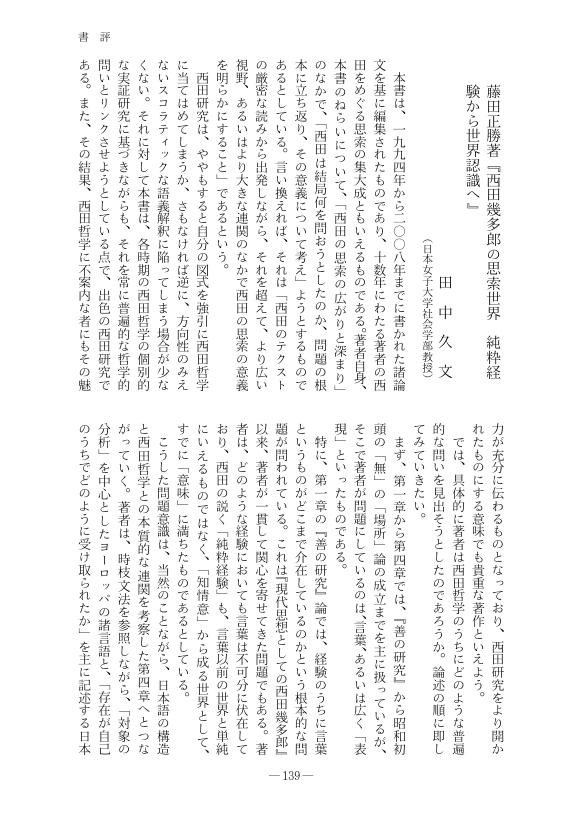2 0 0 0 価値語の様態とその構造
言葉には価値を示す言葉と事実を示す言葉とがある。その二つの性格が一つの言葉のうちで重なる場合もある。本研究では、言葉のそうした面について、参加者のさまざまな視角を提示し重ね合わせることを通して、倫理的な価値の多様なあり方の諸相を検討することを試みた。三年間の共同研究を経て明らかになったことを要約すると次のようになると思える。価値語・評価語のあり方にかかわって考えを進めるあり方には、大旨、少なくとも三つの方向がある。第一にあるのは、価値を含む言葉はそもそもどのような組成を備えて成り立つ、と見定めるのが妥当なのか、事実を示すとみなされる語と価値を示す語とは、どんな位相の差を示すものとしてあるのか、あるいはそうした位相の違いといったものなどはそもそもないと定める視点を立てることもできるのかどうか、といった点について、事を抽象する方向に眼を据えて思索を試みる、といった質の究明である。第二にあるのは、徳目としてしばしば話題にされる質の概念、あるいはもう少し広い幅で、人の価値指針となるような概念の成り立ちや意味を問う、といった視点からの究明である。儒学が倫理思想の体裁をとって問題にされる際には、そうした側面がとりわけ立ち上がることになる。旧来、この面の検討は、かなりなされることがあった、といえる。第三としてあるのは、広く日常にも用いられている言葉のうちに含まれている価値指示のあり方(たとえばさまざまな形容詞のうちに籠められているさまざまな価値内包性といったあり方)について、その意味内包のいろいろな方向の検討を試みるといった質の究明である。仔細は、報告集の参加者の論文のうちに見られる。
1 0 0 0 OA 日本思想史における西田哲学の意義 高橋・西田・田辺
- 著者
- 田中 久文
- 出版者
- 西田哲学会
- 雑誌
- 西田哲学会年報 (ISSN:21881995)
- 巻号頁・発行日
- vol.12, pp.1-17, 2015 (Released:2020-03-21)
1 0 0 0 OA 書評 藤田正勝著『西田幾多郎の思索世界 純粋経験から世界認識へ』
- 著者
- 田中 久文
- 出版者
- 西田哲学会
- 雑誌
- 西田哲学会年報 (ISSN:21881995)
- 巻号頁・発行日
- vol.9, pp.139-142, 2012 (Released:2020-03-22)
1 0 0 0 OA 西田の国家論の特質とその問題点
- 著者
- 田中 久文
- 出版者
- 西田哲学会
- 雑誌
- 西田哲学会年報 (ISSN:21881995)
- 巻号頁・発行日
- vol.7, pp.77-90, 2010 (Released:2020-03-23)
Compared with other contemporary Japanese philosophical ideas, Nishida’s theory of the nation is original in character. This paper will focus on the fundamental qualities of Nishida’s theory of the nation in terms of three points of view: individuality, universality and transcendency. Although Nishida insists that the nation is based on ‘historical species,’ he does not ignore the question of individuality in his theory of the nation. In fact, he argues that the nation is created by individuals. This individuality is also related to the question of universality in that individuals create nations through a kind of universality. The nation is, as such, not something solitary but instead something international in nature. The individuality or specificity of the nation is, morevoer, deeply rooted in what Nishida calls transcendency, or ‘absolute nothingness’. Consequently, the nation, which is created by individuals, has its own transcedental qualities. After discussing these issues, the paper then turns to Nishida’s hypothesis about the role of the nation in the evolution of world history. Nishida insists that all national cultures are metamorphoses of one‘cultural prototype’, suggesting that there are no essential differences of worth or value among different cultures. This position also supports the peaceful coexistence of different nations and peoples through mutual effort. Nishida surmises that Japan has this as its world historical mission, namely, bridging the gap between East and West.
1 0 0 0 OA 『年報第四号』書評
- 著者
- 田中 久文
- 出版者
- 西田哲学会
- 雑誌
- 西田哲学会年報 (ISSN:21881995)
- 巻号頁・発行日
- vol.5, pp.161-167, 2008 (Released:2020-03-24)
- 著者
- 田中 久文
- 出版者
- 昭和堂
- 雑誌
- 日本の哲学 (ISSN:1346051X)
- 巻号頁・発行日
- no.17, pp.32-51, 2016-12
- 著者
- 田中 久文
- 出版者
- 日本倫理学会 ; 1952-
- 雑誌
- 倫理学年報 (ISSN:04830830)
- 巻号頁・発行日
- vol.64, pp.69-73, 2015


